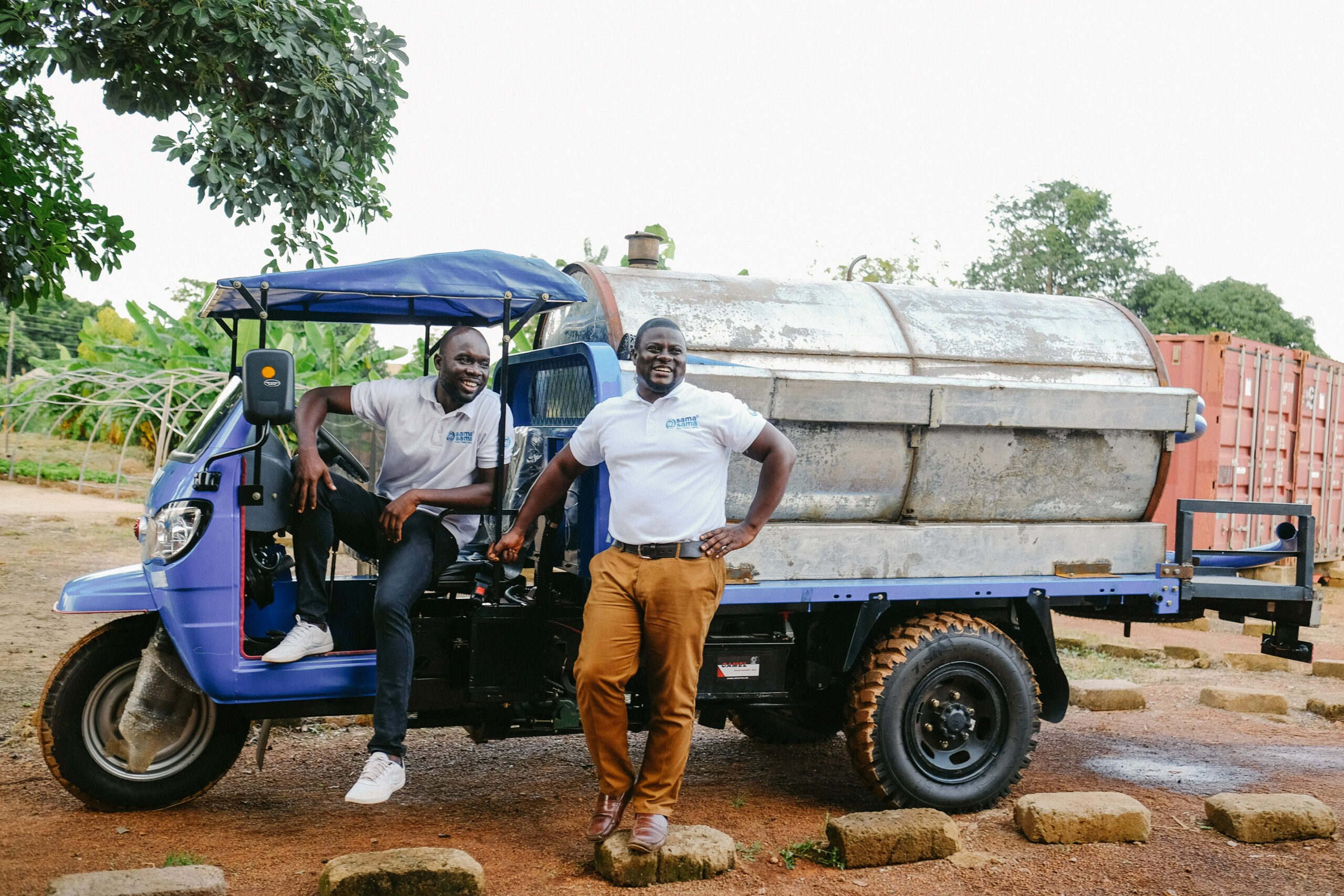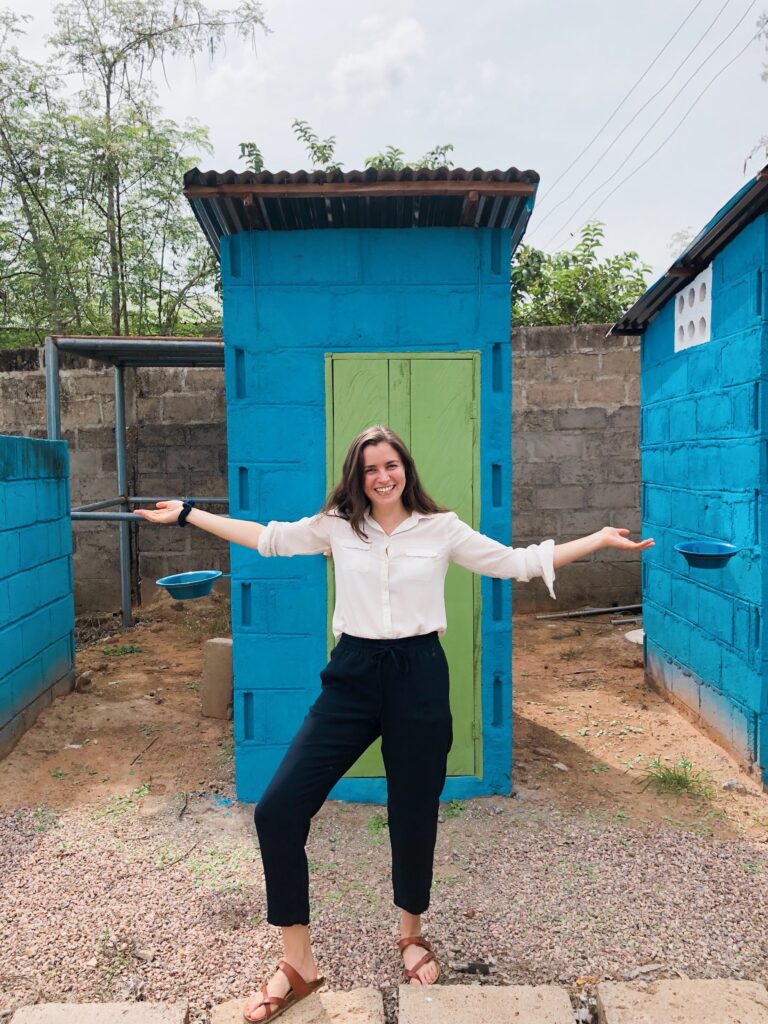Sanitation Business and Research

”What you do makes a difference, and you have to decide what kind of difference you want to make.” –Jane Goodall
It’s said that each generation stands on the shoulders of those who came before them. So for future generations to grow up in a world less hungry and impoverished means it’s up to today’s generation to
help make it possible.
As more voices are heard calling for higher education, gender equity and increased leadership roles for women, few people may be more representative of today’s ‘Generation Possible’ than Melanie Holland. As part of her Masters program, the 23-year-old engineering student from University of Colorado Boulder recently completed a two-month practicum with iDE in Ghana to acquire her certificate in Engineering for Developing Communities. The experience, she says, has affected her profoundly.
What drew you to iDE Ghana?
This practicum with iDE appealed to me because it involved projects in both sanitation and agriculture. Sanitation is widely recognized as having one of the most positive, transformative impacts in low-income countries, because access to improved sanitation facilities increases overall wellness and quality of life.
iDE Ghana is making great strides in this sector with Sama Sama, a social enterprise that provides pour-flush latrines to low-income households. I feel very fortunate that I was able to work with Sama Sama’s founder, Val Labi, who has so many insights and strategies for increasing the impact of sanitation infrastructure in Northern Ghana.
The agriculture component of this practicum was also extremely appealing to me. Korsung, another iDE social enterprise project, provides technical expertise, overhead expenses and market access to participating farmers in order to improve the quantity, quality and diversity of their crops.
Agriculture has the powerful potential for alleviating poverty, and in rural Ghana agriculture is often the primary source of income for households. When agricultural production is improved in these communities then there will be a corresponding increase in food security and wellness, and a boost to the local economy. It was enormously exciting to see the beginning stages of the Korsung project come to fruition during my time in Ghana.
What kind of research were you doing with Sama Sama and Korsung?
Sama Sama has been selling toilets since 2016 and is now preparing for the aggregation and treatment of fecal waste. As part of my practicum, I assisted in the preparation of fecal sludge removal and transportation to the wastewater treatment plant in Tamale. I worked with Ebenezer Atsugah, the Chief Operating Officer of Sama Sama for iDE Ghana, who designed and oversaw the fabrication of the fecal sludge truck. My part was to create a Risk and Mitigation register, training materials for operational employees, and process flow diagrams for associated operations.
With Korsung, I helped write funding proposals and participated in planning for the first harvest. As an independent study, I started a small-scale mushroom farm at the iDE office to identify the potential shortcomings and benefits of mushroom production in Northern Ghana. Mushrooms are a high-value and nutritious crop that can be grown with little water, so they’re ideal for the arid climate of Northern Ghana where access to water in the dry season is extremely limited. The pilot mushroom farm was a success; now more data must be collected to quantify potential risk and determine how to scale mushroom farms for local communities and families.
Is your generation’s involvement in non-profits important?
There’s enough room for people from all generations and ages to get involved with non-profits. In any decision-making environment you need a variety of perspectives to develop truly effective and lasting solutions for difficult issues. Millennials, like all previous and future generations, provide a perspective that is unique to them. As just one example, there’s room for younger generations to play a pivotal role in identifying and expanding the use of more cost-effective and sustainable web-based virtual development tools and practices.

What role can non-profits play in gender equity?
In Ghana specifically, women do not have equal access to career opportunities and are often excluded from roles that are not traditionally female. In the agricultural sector, female farmers often lack the same resources – such as finances, farm inputs, and market access – as male farmers. Gender inequality is seen in specific agricultural practices, such as the production of shea butter from shea nuts. Harvesting and processing of shea nuts is considered solely women’s work, and often involves long hours, heavy labour and harsh working conditions. Women and young girls carry heavy loads of shea nuts extremely long distances, and roast the nuts over wood burning fires in hot and arid conditions. This practice is strongly rooted in tradition, and not many people question why it’s only women who work with this crop.
Social and economic progress stagnates when women are prevented or discouraged from reaching their potential. Discrimination and exploitation makes it difficult – sometimes impossible – for women to raise themselves and their families out of poverty.
Women must have equal access and opportunity, not only because it would augment the local economy and increase overall wellness, but because it’s a basic human right.
There’s no silver-bullet solution to gender inequality, but engaging and supporting women in traditionally male dominated agriculture fields is a step in the right direction.
How important is it to see women in leadership roles?
Along the same lines, female leadership is vital to the success of any women’s empowerment endeavor. Female leadership, especially in spaces that are typically male-dominated, provides that voice for the under-represented and inspires young women to get involved in decision-making.
iDE Ghana is certainly unique in that there is strong female leadership and an emphasis on empowering women in the workplace and in local Ghanaian communities.
What are your biggest takeaways from your iDE experience?
This was my first time traveling to Africa and I’m extremely grateful that I was able to complete this practicum with iDE Ghana because the experience has erased many of my misconceptions. In two months, I learned not only about engineering applications in agriculture and sanitation but also something about the hopes and resilience of Ghanaian people, communities and governments. It was inspiring to work with so many dedicated and passionate people working tirelessly to improve their communities.
Traveling to Ghana, interacting with people, hearing their life experiences, and seeing firsthand many of their daily trials and triumphs have all given me an invaluable context to global development. Both my career outlook and my personal perspective have changed drastically because of this experience.
